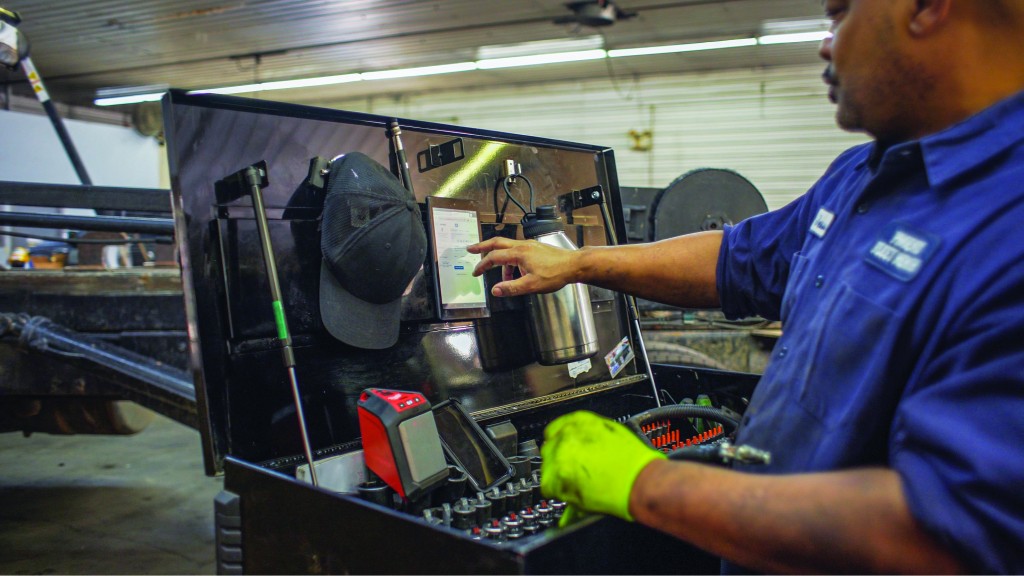Fullbay eliminates paper-based work orders in heavy-duty repair shops
Software workflow solution keeps wrenches turning

A good technician is hard to find. Keeping tradespeople doing skilled labour instead of pushing paper is vital to getting equipment back on the job efficiently. Fullbay has stepped in to eliminate paper with its software solution. Fullbay's heavy-duty repair shop software keeps the flow of work orders to technicians running efficiently, eliminates redundant input work that comes with working on paper, and optimizes a shop's approach to preventive maintenance.
"My background is in electronic medical records and I'm fascinated with the idea of using software as a tool for healing," said Fullbay CEO Jacob Findlay. "The thesis with Fullbay is to build a record for trucks and heavy equipment and apply some of the best ideas around using software and tools for healing people to the repair industry."
Eliminating the pile of paper
When a shop is run on paper, technicians wind up standing around waiting for a paper assignment to come from the service manager. When the biggest challenge for heavy-duty repair shops is finding these technicians – especially diesel technicians – that's a problem, according to Findlay.
Once a technician has diagnosed a problem, a repair can get expensive. With paper, that technician needs to log the problem, then physically take the recommendation to the service manager. The service manager then needs to go to the parts manager and the parts manager needs to call up suppliers to check prices so that an estimate can be built. That estimate then needs to be communicated to the customer so they can authorize the cost.
By eliminating paper and immediately sending the technician an electronic assignment on a tablet or smartphone the chain of actions is transferred into an efficient digital workflow, which enables the technician to get to turning wrenches faster, according to Findlay.
When Fullbay's solution is implemented, technicians receive electronic work orders on tablets or smartphones. They document the repairs and parts needed in the app and that request goes immediately to the parts manager. The parts manager can send the request directly to the vendor, or pull up the vendor's contact information in the app. The system marks up the parts immediately.
"What can take several hours we've compressed down to just a few minutes and what's produced is an accurate estimate down to the penny that can be sent to the customer," said Findlay.
Fullbay's software frees up technicians to do what they do best – fix the equipment. It also allows the owner of the shop to monitor shop activities in real time without having to dig through stacks of paper to find out what's going on.
Implementing the Fullbay solution
Fullbay has self-paced training integrated into the application and offers remote one-on-one training sessions and milestones to help staff learn the application. Then Fullbay takes the existing operation's data and imports it into the system. Fullbay has the capability to import service history for units depending on the program they are coming from and how clean the data is. Importing service history is not part of the standard setup fee and is an additional charge.
"We prep their data, get it imported, get everybody up and ready to go and train them so they can be successful. Once they're using the software, we give them the dashboards and key metrics they need to monitor the shop."
When technicians log into the app they can immediately see their service orders, the customer complaint, and everything they need to know to properly diagnose and repair the equipment. Technicians also have a scoreboard to monitor their own performance and productivity.
As for getting skilled technicians into shops, Findlay said that Fullbay supports initiatives and educational opportunities that change the perception of entering trade school as a lesser option compared to a university education. According to Findlay, the number of diesel technicians retiring is of particular concern. The ratio of retirees to new diesel technicians is abysmally low.
On the office side, managers can track the higher-level concerns of the business, such as whether the shop has been paid, whether vendors have been paid, the shop's total expenses, total revenue and how efficient they are running.
"We commit to the shop that we will solve their key pain points," said Findlay.
The customer can draw on their own experience to improve operations and draw from Fullbay's best practice recommendations on how to run a shop if they encounter an issue they haven't seen before.
"At the end of the day, preventing and reducing downtime is the key to a shop's success. The better a shop can do that, the more satisfied customers will be and the more profitable the shop will be," said Findlay.



